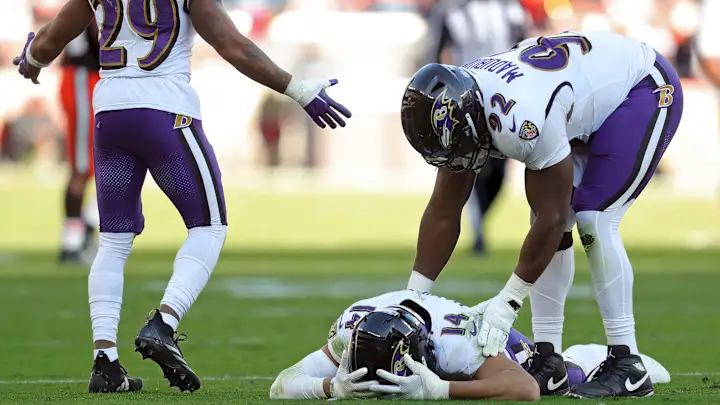
Kyle Hamilton’s Ravens Master’s Tournament Analogy Is Perfect
In recent times, sports analogies have become an effective way for players, coaches, and analysts to explain complex tactics, team dynamics, and individual performances. The beauty of an analogy lies in its ability to simplify intricate concepts and make them more digestible for both fans and those less familiar with the sport in question. Recently, Kyle Hamilton, the star safety for the Baltimore Ravens, shared an analogy comparing the Ravens’ football strategy to the prestigious Masters Tournament in golf. This unique comparison resonates deeply and provides a window into understanding the complexities of football in a way that aligns with the precision and meticulous nature of golf.
Hamilton’s use of this analogy is not only compelling because of the deep connection between football and golf, but it also sheds light on the nuances of game management, decision-making, and the importance of strategy in both sports. Let’s explore why this analogy is perfect by first diving into both football and golf, their key similarities, and how Hamilton’s comparison encapsulates the core values of the Ravens’ football approach.
The Masters Tournament is one of the four major professional golf championships, and it stands out not just because of its historical prestige, but because of its demanding nature and the mental endurance required to succeed. Every golfer who qualifies for this prestigious event is expected to possess a rare combination of skill, consistency, and mental toughness.
The course itself – Augusta National Golf Club – is known for its challenging terrain, strategic design, and elements that can change the entire trajectory of a golfer’s round. Success at the Masters requires more than just a powerful swing; it demands patience, discipline, and the ability to execute difficult shots under immense pressure. Every decision made on the course, whether it’s choosing the right club or managing the wind, plays a role in the outcome. A golfer’s mindset, how they handle adversity, and their ability to adjust in real-time are pivotal to winning.
This type of precision is similar to what is required in football, particularly in the modern game where split-second decisions can have massive consequences.
At its core, football is about making the right decisions in real-time. It’s a game of strategy, where players must execute their assignments with precision, often under intense pressure. The most successful teams are the ones that consistently make the right decisions, whether on offense, defense, or special teams. Much like golf, every play is a calculated risk that can either result in success or failure based on timing, execution, and adaptation to the opposition.
Take, for instance, the idea of situational awareness in football. Coaches and players are constantly analyzing field position, time on the clock, and what the opponent’s tendencies might be. The best teams, like the Ravens under coach John Harbaugh, thrive in these situations because they are able to adjust their game plans in real-time, much like a golfer adapts their strategy based on the weather or course conditions.
In both sports, athletes must remain calm under pressure. A football game can change on a single interception or a critical third down conversion, just as a golfer’s round can be derailed by a single mistake or an unexpected gust of wind. The mental fortitude required in both situations cannot be overstated.
Hamilton’s analogy underscores this similarity. As a safety for the Ravens, he is tasked with reading the quarterback’s eyes, anticipating offensive plays, and then reacting quickly in real-time. These decisions, often made in the blink of an eye, are analogous to a golfer’s decision-making process when deciding whether to go for the green in two on a par-5 or play it safe and lay up. Both require a deep understanding of the game, situational awareness, and the ability to perform under pressure.
When Kyle Hamilton compares the Ravens’ football approach to the Masters, he is highlighting the team’s emphasis on patience, precision, and thoughtful decision-making. The Ravens are known for their disciplined style of play, which focuses on minimizing mistakes, staying within their systems, and adapting to the flow of the game.
In many ways, the Ravens’ defense is a reflection of Hamilton’s description of the Masters. Defensive schemes, just like a golfer’s shot selection, are rarely about aggression for the sake of it. Instead, it’s about waiting for the right moment to strike. The Ravens don’t always play for the flashy interception or the sack – instead, they prioritize controlling the game, managing tempo, and putting themselves in a position to capitalize on the opponent’s mistakes.
Hamilton, who is known for his football IQ and ability to read plays, epitomizes this mindset. He doesn’t rush in to make a play without considering the situation. Much like a golfer carefully selecting their club or adjusting their stance, Hamilton’s success comes from his ability to make the right read and then execute at the highest level when the moment is right.
One of the most important aspects of both football and golf is execution. In football, a well-designed play is only as good as its execution. A quarterback can call an amazing play, but if the offensive line fails to block properly, the play is doomed to fail. Similarly, even the most well-thought-out strategy in golf can falter if a player’s execution is off. The swing needs to be precise, the approach needs to be calculated, and the mental game must be on point.
For the Ravens, this means that their game plan is only effective if every player does their job. Whether it’s the offensive line protecting Lamar Jackson or the defensive unit reading the quarterback’s eyes, execution is key. Kyle Hamilton’s role as a safety is especially tied to execution. He needs to know when to cover deep, when to step up and assist with the run game, and when to read the quarterback’s throw. Each decision, much like a golfer choosing the perfect shot for the given hole, is part of a greater strategy that ultimately determines success.
Hamilton’s analogy underscores how both football and golf require patience in the face of uncertainty. In football, this might mean taking calculated risks on a big third down or understanding when to force a turnover. In golf, it could involve laying up on a par-4 to avoid trouble rather than going for an aggressive, risky shot. It’s about knowing when to take chances and when to play it safe – a skill that both football players and golfers must constantly refine.
Perhaps the most important comparison between football and golf lies in the mental aspect of both games. The ability to adjust to changing circumstances is critical, and this is where the analogy between the Ravens and the Masters tournament truly shines. In golf, players are constantly confronted with variables they cannot control – the weather, the condition of the course, and even the pressure of the competition. Similarly, in football, teams must adjust to the evolving dynamics of the game, often in response to changes in weather, momentum shifts, or unexpected mistakes.
Kyle Hamilton’s role as a safety requires him to read the offense, understand the tendencies of opposing quarterbacks, and adjust his position accordingly. Like a golfer carefully reading the green to anticipate how the ball will roll, Hamilton must continuously read the offense and adjust his positioning based on the offensive formation, the quarterback’s intentions, and the situation at hand. This is why the analogy is so powerful: Hamilton isn’t just reacting to what is happening – he’s thinking ahead, just as a golfer does when lining up their next shot.
At the core of both football and the Masters is an unwavering focus on fundamentals. In golf, it’s about having a consistent swing, understanding the course, and knowing when to take risks. In football, it’s about having a disciplined approach to blocking, tackling, and executing plays within the structure of the team’s game plan. The Ravens, under John Harbaugh, are known for their ability to execute fundamentals at a high level, and Hamilton’s analogy emphasizes this. The Ravens’ defense doesn’t just rely on flashy plays or individual heroics. They rely on executing the fundamentals perfectly, much like a golfer who has honed their technique over years of practice.
Kyle Hamilton’s analogy between the Ravens’ approach to football and the Masters Tournament is a brilliant way of capturing the essence of what it takes to succeed at the highest level. Both football and golf require a combination of strategy, precision, patience, and mental toughness. Whether it’s reading a quarterback’s eyes or reading the wind on the 18th hole, the ability to make the right decisions at the right time is critical in both sports.
Ultimately, Hamilton’s comparison offers a deep and insightful look into the nature of competition, the importance of mental preparation, and the role of execution in achieving success. It reminds us that success in any sport, whether on the football field or the golf course, is not just about raw talent – it’s about making the right decisions, executing them with precision, and staying composed when the pressure is at its highest. Just like the Masters, football is a game that rewards those who can master their craft and play with both intelligence and skill.





